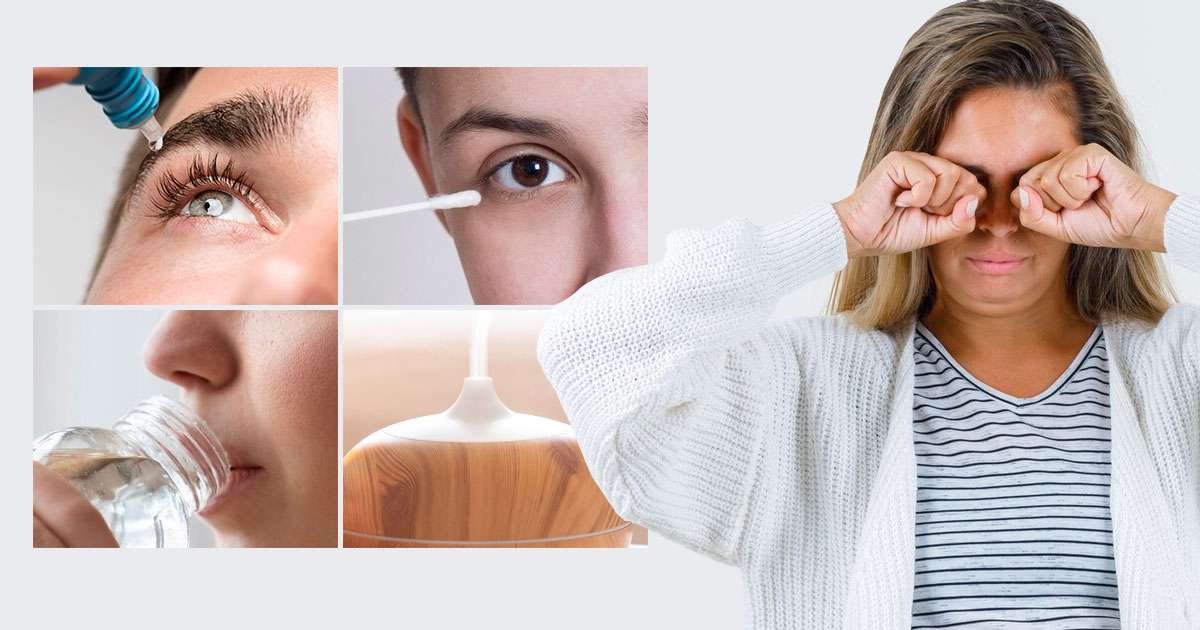Causes and Solutions for Dry Eyes During Nighttime

If you often wake up with dry, tired, or gritty eyes, you might have dry eyes. It can mess up your sleep and make you feel exhausted, even if you slept for a good amount of time. Figuring out what’s causing it is key to feeling better. Dry eyes at night can happen because of health issues, not making enough tears, certain medicines, or low humidity in your bedroom.
If you’re dealing with dry eyes when you wake up, it’s a good idea to see an eye doctor for a checkup. They can figure out why you’re having this problem and help you find ways to feel more comfortable.
Dry Eye Disease
Dry eye disease is one reason why your eyes get dry at night. It affects lots of people, about one out of every five. It happens when your eyes don’t make enough tears or when tears dry up too fast. This can make one or both of your eyes feel uncomfortable. Tears usually have three components:
- Water
- Oil
- Mucus
If there’s something wrong with any of these layers, it can cause dry eye disease. But don’t worry, there are ways to treat it. If it’s serious, your doctor might give you special medicine. For milder cases, you can use stuff like artificial tears that you can buy without a prescription.
There are two main kinds of dry eye disease that can bother you alone or at the same time.
Aqueous deficiency
Sometimes, a problem called aqueous deficiency occurs when your lacrimal glands don’t make enough watery tears. This type of tear is just one part of your tears, but when there’s not enough of it, it can lead to dry eye disease. Aqueous deficiency is responsible for about one-tenth of all dry eye cases.
Evaporative dry eye
Evaporative dry eye happens when something blocks the meibomian glands, which make the oily part of your tears. When these glands get clogged, the oil can’t do its job, and your tears evaporate too quickly. This leaves your eyes feeling dry.
Lots of things can clog these glands. For example, if you don’t blink often enough, stuff can build up on the edges of your eyelids and block the glands. When you’re really focused on something, like staring at a computer or reading, you might blink less, which can also lead to clogged glands.
Dry eye can cause different symptoms, like:
- Eyes that burn or ache
- Feeling like there’s something gritty in your eye
- Blurry vision
- Mucus around your eyes
- Eyes that are too watery
- Discomfort when you wear contact lenses
- Tired eyes
Dry Eyes When Sleeping
Ever wonder why your dry eyes act up more at night? Well, there are a few reasons why you might wake up feeling like your eyes are sandy or burning:
- Nocturnal lagophthalmos: This big word just means that when you sleep, your eyelids don’t close all the way, leaving your eyes exposed to the air. That can dry them out.
- Not enough tears being produced at night: Your eyes might not make as many tears while you sleep, which can make them feel dry in the morning.
- Medicines: Some medications can make your eyes drier, and if you take them before bed, you might notice it more when you wake up.
- Dry air in your room: If the air in your bedroom is dry, it can suck moisture from your eyes while you sleep, leaving them feeling parched in the morning.
Nocturnal lagophthalmos
Ever heard of nocturnal lagophthalmos? It’s when your eyelids don’t completely shut when you sleep. They might look closed, but they don’t make a good seal to keep your eyes moist. This can happen because:
- Head or jaw injuries
- Bell’s palsy
Insufficient tear production
If your eyes don’t make enough tears when you sleep, they can’t clean out stuff that might cause inflammation. Tear production can drop because of getting older, having some health problems, or taking certain medicines.
Medications
Some medicines you take can make your eyes dry when you’re asleep. Here are a few examples: antihistamines and decongestants, chemotherapy drugs, antidepressants, and acne medications.
Low humidity or dry air
If your eyes suddenly feel dry, it might be because the air around you doesn’t have enough moisture. Especially in Canada during winter, the air gets really dry, which can make dry eye symptoms worse, even if you never had them before.
How to Prevent Dry Eyes at Night or While Sleeping
To help with dry eyes while you sleep, it’s important to understand what’s causing it. For personalized advice, talk to your eye doctor about your symptoms. Here are some simple tips to try:
- Drink plenty of water to stay hydrated.
- Use a humidifier in your room to add moisture to the air.
- Clean your eyelids to remove bacteria buildup.
- Use eye drops during the day and before bed to keep your eyes moist.
- If you wear contact lenses, take them out before sleeping.
- Apply a warm compress to your eyes before bedtime to help your tears stay healthy.
- Follow your eye doctor’s recommendations for using ointments or artificial tear gels.
Find the Best Relief for Dry Eyes at Night
If you often wake up with dry, tired, or gritty eyes, you might have dry eyes. It can mess up your sleep and make you feel exhausted, even if you slept for a good amount of time. Figuring out what’s causing it is key to feeling better. Dry eyes at night can happen because of health issues, not making enough tears, certain medicines, or low humidity in your bedroom.
To keep your eyes feeling better, talk to an eye doctor about your symptoms. They can figure out why you’re having this problem and help you find ways to feel more comfortable.

